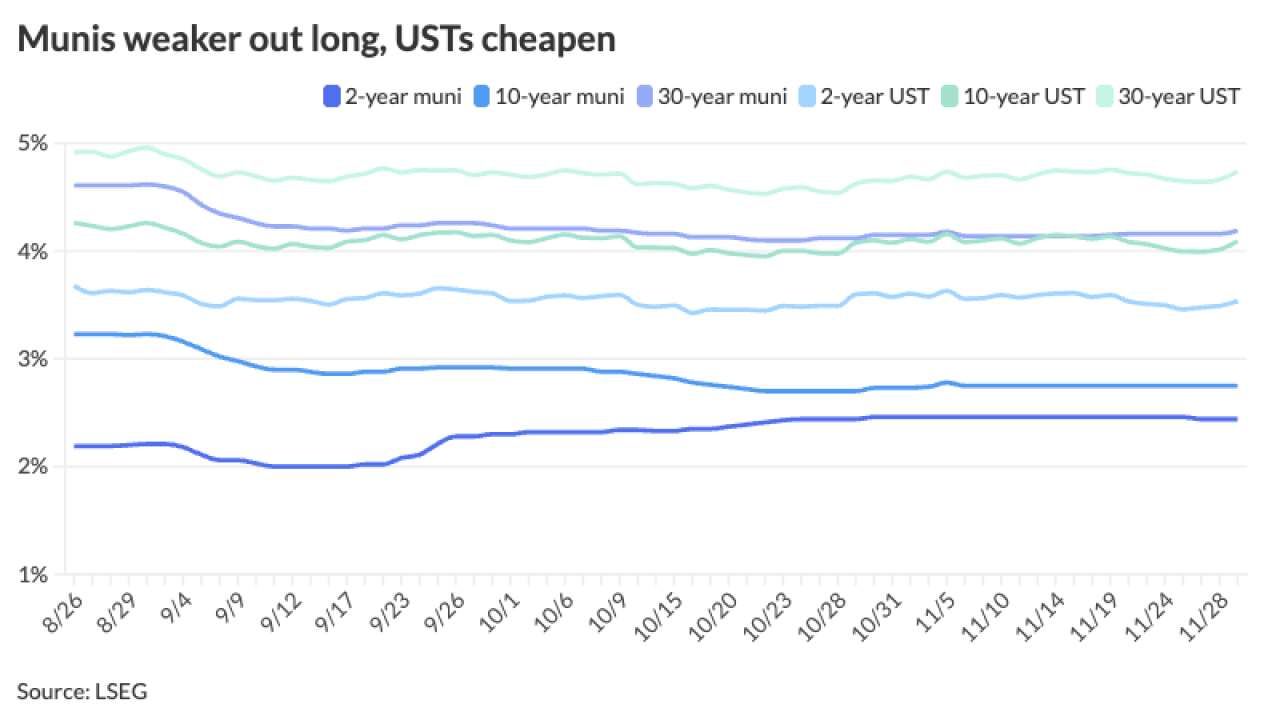CHICAGO — Bondholders’ and insurers’ decisions not to challenge Detroit’s eligibility to file for Chapter 9 bankruptcy reflect lessons learned in Stockton, Calif., municipal bond attorneys said.
More than 140 creditors objected to Detroit’s eligibility to file for Chapter 9 bankruptcy protection by the Monday deadline set by federal Judge Steven Rhodes, who is overseeing the historic case.
The objections came from dozens of individual retirees, the city’s unions, and its two pension boards.
There were no objections from bondholders or bond insurers, who face steep losses under emergency manager Kevyn Orr’s plan to treat $2 billion of bond debt as unsecured.
Assured Guaranty Corp. and National Public Finance Guarantee Corp., insurers that together wrap $4.6 billion of secured and unsecured Detroit bonds, declined to comment. Both insurers contested Stockton’s eligibility to enter bankruptcy earlier this year, a move that proved unsuccessful and expensive.
“It’s an object lesson that comes from Stockton, that objecting to eligibility is no longer your first opening move,” said Karol Denniston, a partner with Schiff Hardin LLP, which represents bondholders and other creditors in the Detroit case. “The smart money says this is not our issue, and we don’t want to waste time.”
To qualify for bankruptcy, Detroit has to meet five criteria, including proof that it’s insolvent, that it negotiated in good faith with its creditors or that such negotiations were too difficult, and that it has state authorization to file.
“If you are a bond insurer or holder, do you want to spend a lot of money proving Detroit doesn’t meet any of these five tests?” said Frank Shafroth, director, Center for State and Local Leadership at George Mason University and a public finance attorney.
“Lawyers, and in particular bond attorneys, cost a lot of money,” he said. “Do you really want to spend a lot of money on something that hard to argue?”
Bond insurers and investors who challenged Stockton’s eligibility found themselves “eating a lot of humble pie,” Shafroth said.
Since Orr unveiled his plan to issue $2 billion of notes to distribute among holders of the city’s $11.4 billion of unsecured debt, many muni experts have said bondholders are better off taking their chances in a bankruptcy than agreeing to a such a steep haircut.
“The general perception is that we’re better off having the conversation with the bankruptcy judge in the middle than on our own,” Denniston said. “If they’re ineligible, and the case is dismissed, you just made chaos squared.”
The eligibility trial is set for Oct. 23.
The objections that were filed by retirees, unions and pension systems primarily argued that Orr did not engage in sincere negotiation in the weeks before Detroit’s July 18 bankruptcy filing and that the filing violates state law because it will violate the Michigan constitution by impairing pensions.
The filing by the city’s largest union, the Michigan chapter of the American Federation of State, County and Municipal Employees, went so far as to challenge the entire concept of municipal bankruptcy, arguing that Chapter 9 is unconstitutional because it allows federal law to trump state law.
The city’s two pension systems, the General Retirement system and Detroit Police and Fire Retirement System, which are the city’s two largest unsecured creditors with more than $9 billion of debt, argued in a joint objection that state law prohibits the filing and that Detroit did not negotiate in good faith with its creditors.
“[B]y authorizing a contingency free bankruptcy that makes no exception for the accrued pension benefits of the city’s past and present employees, the Governor stepped outside the bounds of his authority,” the objection said.
Attorney General Bill Schuette filed a brief saying he believed the city was eligible and that Snyder has the legal authority to approve the filing. But Schuette warned that any attempt to cut pensions would be illegal.
Schuette had previously said he would join the case as the “people’s lawyer” to argue for constitutional protections of pensions, which is “absolute,” he said.
“The city can no more authorize a plan that reduces accrued obligations to public pensions than a plan that discriminates on the basis of religion,” Schuette said in his brief. “The city of Detroit is constitutionally obligated to keep the People’s promise as it proposes a plan that will allow the city to flourish while honoring the lifelong commitment of Detroit’s retired public servants.”
Schuette added that neither the city’s retiree health care costs nor its unaccrued pension liabilities are protected, only the vested pensions.
In separate news, officials from the city’s pension systems -- which represent about 70% of the city’s 21,000 retirees -- met with members of Orr’s team Monday for several hours to discuss a dispute over the size of Detroit’s total unfunded pension liability.
Orr’s restructuring plan is based on the projection that the unfunded liability totals $3.5 billion, while the pension systems put the figure around $650 million.
A pair of actuarial reports made public Monday by the Detroit Free Press backed up Orr’s claims, saying the unfunded liability could be as high as $3.7 billion in 2016.
The reports, commissioned by Orr from the Chicago-based actuarial firm Milliman, said the police and fire fund is around 80% funded while the general employee retirement fund is between 50% to 60% funded.
Orr would be allowed to take over the funds if he can prove they are less than 80% funded under state law. A complete report will be released next week, according to the Free Press.
A status conference hearing on the bankruptcy is set for Wednesday at 10 a.m.





